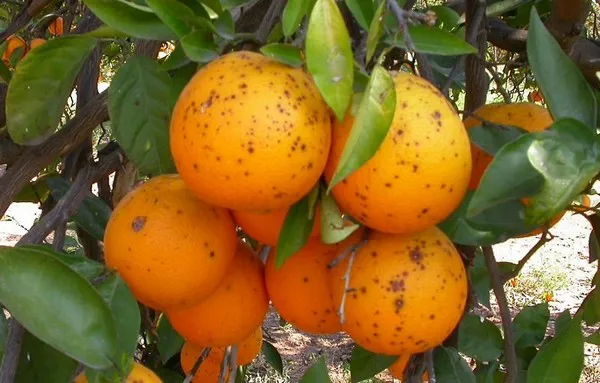LA UNIÓ de Llauradors stated that the EU had rejected a total of 30 shipments of citrus fruits from third countries in January and February because they contained pests. All of these shipments came from Tunisia (18) and China (12).
The harmful organisms detected in the merchandise from Tunisia were mealybugs. However, it should be noted Tunisia has detected the presence of the black spot disease (Citrus Black Spot) in its territory. This disease is caused by the fungus Phyllosticta citricarpa and mainly affects citrus fruits, although it can also infect leaves and stems, causing their commercial deterioration. It is the same pest that threatens the European citrus industry through imported citrus from South Africa, together with the Thaumatotibia leucotreta moth.

Citrus affected by the black spot disease.
Faced with the threat of this pest and the increased detection of its exports with harmful organisms, LA UNIÓ de Llauradors believes that Tunisia cannot guarantee they'll send shipments free of pests. They demand that the European Commission carry out phytosanitary audits and suspend imports from all the countries that cannot guarantee to make citrus exports without pests.
“Yes, we live in a globalized world, but not everything should be valid in trade. The European Commission should carry out phytosanitary audits in countries like Tunisia. In the meantime, they should suspend imports from this origin to the community -as it was recently done with Argentina- until they can guarantee their safety,” stated Carles Peris, the general secretary of LA UNIÓ.
Citrus detections entering the EU from China contained, among other harmful pests, the aforementioned Phyllosticta citricarpa fungus or Bactrocera (fruit flies).
LA UNIÓ insisted the EU must implement a single inspection criterion at origin for all third countries, and that imports should enter the EU through a maximum of three EU ports that have a sufficient number of inspectors that are experts in citrus pests and diseases, analyzing a representative percentage of samples.
They also said that cold treatment in transport should be mandatory, as is required of Spain by some countries, and that imports of citrus fruits that have been produced and manipulated with active ingredients that are not authorized in the EU should be banned.
For more information:
LA UNIÓ
www.launio.org
